Editor:
Brandon Sweet
University Communications
bulletin@uwaterloo.ca
Waterloo at 100 update
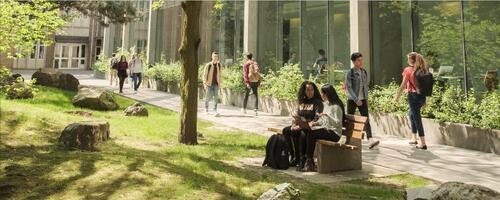
By Sam Charles.
Since releasing the Waterloo at 100 Discussion Paper in September, we have resumed consultations centering on hearing your big ideas. Many have expressed enthusiasm for the longer-range vision for Waterloo at 100. Extending our horizon takes us beyond five-year planning cycles enabling us to make commitments and progress on the big, bold ideas coming out of these consultations.
What We're Hearing
- We need to revisit our current institutional values. As recommended in the President’s Anti-Racism Taskforce (PART) final report, our values should reflect our commitments to decolonization, Indigenization, accessibility, and equity, diversity, inclusion, and anti-racism (EDI-R). Looking ahead to 2057, we can define now what an Indigenized institution looks like. We can plan for a fully accessible campus in all the ways that are important to our future. We can set our aspirations for an institution that no longer needs an EDI-R office. And, we must meet our commitments for a net-zero campus. The vision for Waterloo at 100 will outline as an immediate next step our process for revisiting our values.
- As our most recent strategic plan states, “our greatest impact happens together.” We need to operationalize how the organization works together better, across multiple units and mandates. This includes evolving and innovating on our internal processes, such as budgeting and integrated planning across faculties and academic support units (ASUs) on a 3 to 5 year rolling basis. As one participant recently put it: “collaborate or crumble!”
- We have a responsibility to prepare global citizens: our learners should graduate with a sense of place and responsibility within our local region and our global community. Common courses and other learning experiences that cultivate this mindset could feature in a core curriculum for all students. As shared in a consultation, “our role is not to educate citizens to become good engineers and social scientists, but to educate engineers and social scientists to become good citizens.”
- Over the years, Waterloo has achieved international stature for scholarship, innovation, and teaching that addresses global challenges and varying contexts across our planet. As a university that emerged from the local needs of the community, we are also uniquely embedded in the region and must continue to support thriving economies and a vibrant and inclusive society. In our journey to 100, Waterloo can constantly acknowledge the need for both global and local aspirations in order to make the impacts we desire for all of humanity.
- The consequence of Waterloo’s strength as a research-intensive university will only grow into our future. Both fundamental knowledge that expands the boundaries of human understanding and applied research that equips humanity to address its most challenging problems are essential to Waterloo at 100. Aligning research priorities and activities to the five interconnected futures will position Waterloo to define a concerted agenda in knowledge production, dissemination, and application fit for our future.
- We should also prioritize how we assess the performance of our research. Metrics quantifying the volume of scholarship must be balanced with measures that identify impacts our research makes in society. Embracing the principles of Open Science and global scholarship will help ensure our outputs are increasingly accessible and enable collaboration and interdisciplinarity.
- Our campuses are much more than our physical spaces. We must develop and leverage the technologies that will augment and enhance education, research, and the whole experience for all in our community. As we expand our classrooms to virtual and highly collaborative spaces, we should also optimize our physical spaces for enriching in-person and residential experiences.
Have your say
Thank you for sharing your ideas and for your commitment to the future of our institution. As we conclude our current round of consultations over the remainder of this term, we have commenced preparing the Waterloo at 100 vision document, which we aim to release early next year for feedback. The vision and other updates will be uploaded on the Waterloo at 100 webpage. We encourage you to share the webpage with your colleagues and networks where everyone’s ideas for the vision document can be shared through the feedback form.
New investment paves way towards a more sustainable future
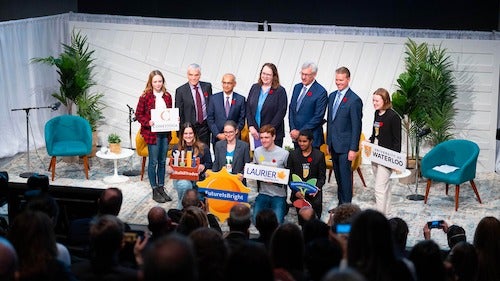
This article was originally featured on Waterloo News.
The RBC Foundation recently announced a $2 million donation to the University of Waterloo to bolster the Bachelor of Sustainability and Financial Management. The program, the first of its kind in Canada, prepares accounting and finance professionals with additional skills beyond practicing accounting and financial management including environmental law, social equality, carbon emissions and ecosystem science.
In addition to the new program, the funding will also establish a Professorship in Sustainability and Financial Management, a network of mentorship and experiential learning opportunities and a hub for sustainability integration where students will collaborate with outside organizations to solve real-world problems under the guidance of Waterloo faculty.
“We see enormous opportunity for sustainable finance to drive the changes our society needs – including a healthier planet and more inclusive, more prosperous communities,” said Vivek Goel, president and vice-chancellor of the University of Waterloo. “Our partnership with RBC spans more than four decades and this new investment builds upon that collaboration to provide our students with the experience and expertise they will need to tackle the challenge of creating a sustainable future.”
Over the past 40 years, RBC has hired approximately 3,000 Waterloo co-op students and partnered with the University of Waterloo on many programs and projects. More than 1,000 Waterloo graduates are employed by RBC including its President and CEO Dave McKay (BMath ’87, DMath ’18).
RBC announced the funding for Waterloo at the Perimeter Institute as part of a $3.5-million investment to all three post-secondary institutions in Waterloo region. The funds, powered by RBC Future Launch, will help develop world class programs with real-world learning opportunities, to help support a more sustainable and inclusive future for green collar work and the skilled trades.
“By investing in our students, we are investing in our future. Supporting skilled trades and green skills learning is key to preparing youth for the jobs of tomorrow,” said Claude DeMone, Regional President, Southwestern Ontario, RBC.
Over the next five years, the investment will help recruit top talent to support and lead the BSFM program, train over 350 highly-skilled students, create a network of mentoring and experiential learning partners, deliver real-world solutions to more than 30 (non-profit, government and industry) partners, and host at least three conferences to share knowledge with industry, government, and academia.
Honouring Pearl Sullivan's "unstoppable spirit"
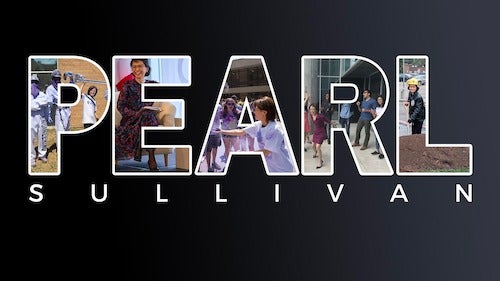
By Carol Truemner.
A beloved former dean whose dynamic leadership was the driving force behind the construction of Engineering 7 will be recognized with the designation of the building’s IDEAs Clinic in her honour.
At an event today celebrating the legacy of Pearl Sullivan, the space will be named the Pearl Sullivan Engineering IDEAs Clinic to commemorate the accomplishments of the eighth dean of Waterloo Engineering and the first woman to hold the post who died after a long cancer battle almost two years ago.
With Pearl at the helm from July 2012 to December 2019, the Faculty reimagined engineering education and research with revolutionary spaces and transformative programs.
Passionate about supporting students, she focused on ensuring they had a full understanding of engineering principles as well as the tools and facilities required to succeed.
Achieved ambitious goals
In 2015, Pearl launched the Faculty’s Educating the Engineer of the Future Campaign and worked tirelessly to achieve its ambitious objectives of building Engineering 7 and providing students with enhanced experiences to help them pursue their goals.
In addition to lecture halls, study areas and the Waterloo RoboHub, Engineering 7, which opened in October 2018, includes the innovative two-floor Pearl Sullivan Engineering IDEAs Clinic.
Created for hands-on design challenges and activities to help teach theoretical concepts, the IDEAs Clinic was inspired by Pearl’s need for students to learn the fundamentals of engineering taught in previous decades.
“The digital generation we teach now has no idea what to do when they open the hood of a car. Most can’t even change an air filter,” she told the audience at her 2017 dean’s reunion lecture. “We’ve got to get our students back to the basics of engineering.”
The IDEAs Clinic hosts many activities including two-day Design Days events for all 14 undergraduate programs at Waterloo Engineering, giving over 2,000 students hands-on learning experiences each year.
Modelled on the concept of a hackathon, Design Days provide students challenging open-ended problems to solve. To be successful, students must define the problem, then develop, build and validate a solution to it.
‘Resilient in her belief of doing what is right’
The Sullivan family is honoured Waterloo Engineering is celebrating Pearl's legacy and designating the IDEAs Clinic in her name.
“Pearl was incredibly passionate about the University of Waterloo and its Engineering program,” said Pearl’s husband Tom Sullivan, a Waterloo civil and environmental engineering project manager. “She was resilient in her belief of doing what is right and now we have a place where the next generation of engineers will be inspired to discover new breakthroughs and reminded of her unstoppable spirit.”
‘An incredibly special person'
Pearl’s three children, Michael, Veronica and Christina, said their mother’s top priority throughout her career was the improvement of the education and experience for Waterloo students and was excited about the opportunities Engineering 7 provided to them and faculty members.
“Mom was an incredibly special person and it’s amazing to see the positive impact she had on so many people’s lives,” they said. “It is inspiring to be reminded of the passion and dedication she brought to the Faculty of Engineering.”
Pearl’s contributions to Waterloo Engineering will be recognized at today’s event by speakers including Mary Wells, current dean of engineering, Sanjeev Bedi, a Waterloo mechanical and mechatronics engineering professor and founder of the IDEAs Clinic, Christina Sullivan and several others.
In honour of Pearl Sullivan’s legacy, we invite you to support the Clinic and help us in naming it – The Pearl Sullivan IDEAs Clinic.
Capturing the Faculty’s oral history
As well as the Pearl Sullivan Engineering IDEAs Clinic, Pearl’s memory will live on as part of Waterloo Engineering’s Heritage Project, led by Wells.
“I was extremely fortunate to know Pearl as a trailblazing woman in engineering, a mentor and a good friend,” said Wells. “My close interactions with Pearl made me realize we need to share Waterloo Engineering’s 65-year history in a meaningful way by capturing the wisdom of many who helped build our Faculty and international reputation over the years.”
An audio clip of highlights from an interview conducted with Pearl in 2015 is the first of a collection of recordings made with former deans, faculty members and others who share their Waterloo Engineering experiences and perspectives. Pearl’s full-length interview will be available on the University archive’s site early next year.
Watch for more interviews to be added to Waterloo Engineering’s Heritage Project site in the months ahead.
In this podcast, Mary Wells, dean of engineering, and Jay Shah, alumnus and entrepreneur, share personal memories of Pearl Sullivan and discuss her many contributions to engineering education at Waterloo.
Vote for the Social Impact Showcase People's Choice award
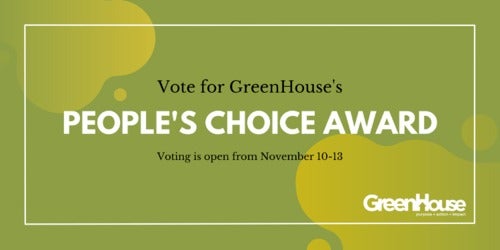
A message from GreenHouse.
Each term, United College’s social impact incubator, GreenHouse, hosts the Social Impact Showcase. It celebrates the amazing work GreenHouse students accomplish through their journeys of social innovation and entrepreneurship, while also providing an opportunity for students to acquire seed funding for their ideas. While the initial adjudication decisions have already been made, there is still time to vote for your favourite student-led social venture in the People’s Choice Awards.
The People’s Choice Award will be given to the social venture with the most online votes, alongside an additional $1,000. This term, there are 13 ventures pitching for funding. Some of the broad themes that this term’s ventures aim to address include food systems transformation, sustainability initiatives, and inclusivity.
Voting opens today, November 10, and goes until November 13 at 11:59p.m. The winners of the People’s Choice Awards will be announced on November 16 via the GreenHouse Instagram account and in person at the Social Impact Showcase. Register today.
Learn more and vote for GreenHouse’s People’s Choice Awards today.
Remembrance Day ceremony in the SLC tomorrow and other notes
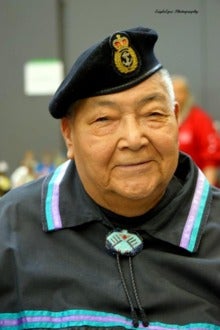 On Friday, November 11, the Faculty of Health and Indigenous Knowledge Keeper Myeengun Henry will be hosting a Remembrance Day ceremony in the Student Life Centre’s Great Hall beginning at 10:45 a.m.
On Friday, November 11, the Faculty of Health and Indigenous Knowledge Keeper Myeengun Henry will be hosting a Remembrance Day ceremony in the Student Life Centre’s Great Hall beginning at 10:45 a.m.
Myeengun Henry will provide welcoming remarks, followed by a recorded recitation of the famous John McCrae poem In Flanders Fields, by Indigenous veteran Arnold Albert (pictured at right).
Students will lower flags at 11:58 a.m. as the Last Post is played. There will be two minutes of silence at 11:00 a.m., followed by the playing of Reveille as the flags are raised again. A video featuring veterans will follow.
The ceremony will conclude at 11:30 a.m.
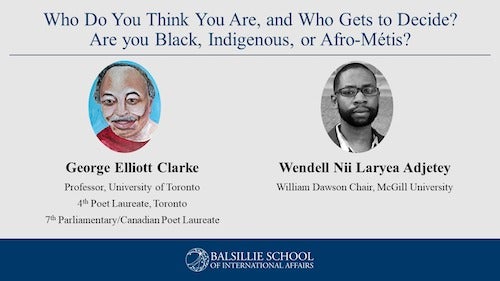
Tonight, the Faculty of Arts and the Balsillie School of International Affairs are hosting a conversation between George Elliott Clarke (BA '84 English) and Dr. Wendell Adjetey from McGill University exploring the complexities of identity and the question, “Who do you think you are, and who gets to decide?”
"Perhaps like most Afro-Metis or Black-and-Indigenous people, George Elliott Clarke never questioned his Indigenous heritage," says the lecture's background information. "He always knew about it, had it verified by a genealogical check, and never thought about it as a means to dodge taxes or demand “rights.” So, he was very surprised when Indigenous people and others called him a “tribal wanna-be” and thought that he was laying claim to an identity that could not be his. That’s when he started to do some digging into the official definition of who can or cannot be “Metis” and discovered that it is extremely problematic–in terms of territoriality, trading history, and, especially, “race”; that it is a bureaucratic definition based on Eurocentrism, sexism, and ahistoricism; and is, in fact, impossible to police. Clarke recognizes the existence of a central, Prairies-based, Metis Nation in Canada. But he also holds that there is more than one, and the others–Eastern, Acadian, “Afro,” etc.– need not look or sound like the one “Nation” endorsed by the Federal Government."
The event takes place tonight from 7:30 p.m. to 8:30 p.m. in the Balsillie School of International Affairs at 67 Erb St West.
"In consultation with the Faculty of Engineering and the Office of the Provost, space currently used by Information Systems & Technology’s Instructional Technologies and Media Services (IST-ITMS) team to provide their Studio services will be transferred to Engineering as there is a need to use the space – the anechoic chambers – for its designed purpose," says a note from IST.
The transition will occur by January 31, 2023.
"Until a permanent solution is confirmed (2023), the followingStudio services will be available in the Mathematics and Computer (MC) building:
- A self-service lightboard studio and an ITMS-staff editing station. Green, white, and/or black screens will not be available. If required, please schedule use prior to January 2023;
- A sound booth with podcast space.
- On-location bookings will continue to be available.
"Information on how these temporary spaces can be booked/accessed, including specific location details, will be shared closer to the January 31, 2023 transition date," says the note from IST. "Communications regarding the future, permanent location of the ITMS Studio will also be shared once confirmed. Anyone with questions can contact Marcel David at mdavid@uwaterloo.ca."
Link of the day
When and Where to get support
Students can visit the Student Success Office online for supports including academic development, international student resources, immigration consulting, leadership development, exchange and study abroad, and opportunities to get involved.
Instructors looking for targeted support for developing online components for blended learning courses, transitioning remote to fully online courses, revising current online courses, and more please visit Agile Development | Centre for Extended Learning | University of Waterloo (uwaterloo.ca).
Instructors can access the EdTech Hub to find support on Waterloo’s centrally supported EdTech tools. The Hub is supported by members of IST’s Instructional Technologies and Media Services, Centre for Teaching Excellence, Centre for Extended Learning and subject matter experts from other campus areas.
Supports are available for employees returning to campus. Visit IST’s Hybrid Work and Technology guidelines and workplace protocols to assist with the transition.
Students with permanent, temporary and suspected disabilities and disabling conditions (medical conditions, injuries, or trauma from discrimination, violence, or oppression) can register with AccessAbility Services for academic accommodations (classroom accommodations, testing accommodations, milestone accommodations).
Instructors can visit AccessAbility Services' Faculty and Staff web page for information about the Instructor/Faculty role in the accommodation process. Instructors/Faculty members are legally required to accommodate students with disabilities. AccessAbility Services (AAS) is here to help you understand your obligations, and to offer services and resources to help you facilitate accommodations.
The Writing and Communication Centre has in-person and virtual services to support grad and undergrad students, postdocs and faculty with any writing or communication project. Services include one-to-one appointments, drop-ins at Dana Porter Library, online workshops, writing groups, English conversation practice, and custom in-class workshops.
Research Ethics: Find yourself with an ethical question, unsure if your work requires an ethics review, or need advice about putting together a research ethics application? Reach out to one of our friendly staff by booking a consultation or email us with your questions.
Co-op students can get help finding a job and find supports to successfully work remotely, develop new skills, access wellness and career information, and contact a co-op or career advisor.
The Centre for Career Action (CCA) has services and programs to support undergrads, grad students, postdocs, alumni, and employees in figuring out what they value, what they’re good at, and how to access meaningful work, co-op, volunteer, or graduate/professional school opportunities. Questions about CCA's services? Live chat, call 519-888-4047, or stop by our front desk in the Tatham Centre 8:30 a.m. to 4:30 p.m., Monday to Friday.
Drop-in to in-person Warrior Study Halls on Thursdays from 5:00 p.m. to 6:30 p.m. in DC and DP. Join a Peer Success Coach to set goals and work independently or in groups each week.
Renison's English Language Institute continues to offer virtual events and workshops to help students practice their English language skills.
If you feel overwhelmed or anxious and need to talk to somebody, please contact the University’s Campus Wellness services, either Health Services or Counselling Services. You can also contact the University's Centre for Mental Health Research and Treatment. Good2Talk is a post-secondary student helpline available to all students.
The Library is here to help, both in person and online. Our spaces are open for access to book stacks, study space, computers and printers, and the IST Help Desk. For in-depth support, meet one-to-one with Librarians, Special Collections & Archives and Geospatial Centre staff. Access our resources online for anywhere, anytime learning and research. Full details on current services and hours are available on the Library’s COVID-19 Update webpage.
The Faculty Association of the University of Waterloo (FAUW) continues to advocate for its members. Check out the FAUW blog for more information.
The University of Waterloo Staff Association (UWSA) continues to advocate for its members. Check out the UWSA blog for more information.
The Sexual Violence Prevention and Response Office (SVPRO) supports all members of the University of Waterloo campus community who have experienced, or been impacted, by sexual violence. This includes all students, staff, faculty and visitors on the main campus, the satellite campuses, and at the affiliated and federated Waterloo Institutes and Colleges. For support, email: svpro@uwaterloo.ca or visit the SVPRO website.
The Office of Indigenous Relations is a central hub that provides guidance, support, and resources to all Indigenous and non-Indigenous campus community members and oversees the University's Indigenization strategy.
The Waterloo Indigenous Student Centre, based at United College, provides support and resources for Indigenous students, and educational outreach programs for the broader community, including lectures, and events.
WUSA supports for students:
Peer support - MATES, Glow Centre, RAISE, Women’s Centre - Click on one of the links to book an appointment either in person or online for the term.
Food Support Service food hampers are currently available from the Turnkey Desk 24/7 in the Student Life Centre. Drop-off locations are also open again in SLC, DC, DP, SCH, and all residences.
Co-op Connection all available online.
Centre for Academic Policy Support - CAPS is here to assist Waterloo undergraduates throughout their experience in navigating academic policy in the instances of filing petitions, grievances and appeals. Please contact them at caps@wusa.ca.
WUSA Student Legal Protection Program - Seeking legal counsel can be intimidating, especially if it’s your first time facing a legal issue. The legal assistance helpline provides quick access to legal advice in any area of law, including criminal. Just call 1-833-202-4571.
Empower Me is a confidential mental health and wellness service that connects students with qualified counsellors 24/7. They can be reached at 1-833-628-5589.
GSA-UW supports for graduate students:
The Graduate Student Association (GSA-UW) supports students’ academic and social experience and promotes their well-being.
Advising and Support - The GSA advises graduate students experiencing challenges and can help with navigating university policies & filing a grievance, appeal, or petition.
Mental Health covered by the Health Plan - The GSA Health Plan now has an 80 per cent coverage rate (up to $800/year) for Mental Health Practitioners. Your plan includes coverage for psychologists, registered social workers, psychotherapists, and clinical counselors.
Dental Care - The GSA Dental Plan covers 60 to 70 per cent of your dental costs and by visiting dental professionals who are members of the Studentcare Networks, you can receive an additional 20 to 30 per cent coverage.
Student Legal Protection Program - Your GSA fees give you access to unlimited legal advice, accessible via a toll-free helpline: +1-833-202-4571. This advice covers topics including housing disputes, employment disputes, and disputes with an academic institution.
The Graduate House: Open Monday to Tuesday 11:30 a.m. to 7:00 p.m. and Wednesday to Friday 11:30 a.m. to 9:00 p.m. We’re open to all students, faculty, staff, and community members. The Graduate House is a community space run by the GSA-UW. We’re adding new items to the menu. Graduate students who paid their fees can get discounts and free coffee.
When and Where
Warriors vs. Laurier Blood Donation Battle. Join our “Waterloo Warriors” team on the Blood.ca website or app. #ItsInYouToGive
Warriors Game Day Tickets and Season Passes, on sale now. Cheer on your Warriors W/M Basketball, Football W/M Hockey and W/M Volleyball teams at home during the 2022-23 season. Purchase today.
Free Staff Workouts, Tuesdays and Thursdays until December 22, 12:15 p.m. to 12:45 p.m. Bootcamp-style classes in the CIF Field House and PAC. Open to all staff and supported by the Staff Excellence Fund. Find out more/register now.
UW Staff Board Foundations workshop Session 005, Thursday, November 10, 11:30 a.m. to 1:30 p.m. via MS Teams. Session 005 Registration link.
Sustainability-Themed Assessment Showcase, Thursday, November 10, 1:00 p.m. to 2:00 p.m.
NEW - Velocity $5K Semi-finals, Thursday, November 10, 5:00 p.m. to 7:00 p.m.
CSTV Movie Night: Rossum’s Universal Robots, Thursday, November 10, 7:00 p.m., E5-6006.
Who Do You Think You Are, and Who Gets to Decide? A conversation with George Elliott Clarke and Wendell Adjetey, Thursday, November 10, 7:00 p.m. to 8:30 p.m., Balsillie School of International Affairs, 67 Erb St West, Waterloo.
NEW - Writing Café (online), Friday, November 11, 9:00 a.m. to 12 noon.
NEW - Remembrance Day ceremony, Friday, November 11, 10:45 a.m., Student Life Centre Great Hall.
NEW - Waterloo.AI Data Challenge - Fall 2022, Saturday, November 12, 7:30 a.m. to 8:30 p.m.
NEW - Fusion Conference, "Advances in Healthcare Innovation," Saturday, November 12, 10:30 a.m. to 7:00 p.m., UW Federations Hall.
NEW - Warrior’s Basketball Home Opener vs. Windsor,Saturday,November 12, (W) 6:00 p.m., (M) 8:00 p.m., Carl Totzke Court. Purchase Tickets.
NEW - Writing Café (online), Tuesday, November 15, 9:00 a.m. to 12 noon.
NEW - Fusing AI and Optimization, inaugural Distinguished Lecture Series presentation by Pascal Van Hentenryck, Georgia Tech, Tuesday, November 15, 11:00 a.m. in DC 1302.
NEW - Exercise as health care: past, present, and future featuring Dr. Paul Oh, cardiologist and medical director of the Cardiac Rehabilitation and Secondary Prevention Program at the UHN-Toronto Rehabilitation Institute, Tuesday, November 15, 6:30 p.m. online and in person at Health EXP 1689. Reception to follow in-person event. Please register in advance.
PhD oral defences
Environment, Resources and Sustainability. Emmanuel Badewa,“The impact of biobased residues on soil health and greenhouse gas emissions under a changing climate”.Supervisor, Maren Oelbermann. Available upon request from the Faculty of Environment, Administrator, Graduate Studies. Oral defence. Monday, November 14, 12:00 p.m.
School of Public Health Sciences. Tauhid Khan, "Self-employment, health, illness, and social security among solo self-employed workers." Supervisor, Ellen MacEachen. Email Health Graduate Administration for a copy. Oral defence Wednesday, November 16, 9:00 a.m., hybrid.
Computer Science. Alexey Karyakin, "Memory Power Consumption in Main-Memory Database Systems." Supervisor, Kenneth Salem. Thesis available from MGO - mgo@uwaterloo.ca. Oral defence Monday, November 21, 9:00 a.m. online.
School of Public Health Sciences. Amanda Doggett, "Body Mass Index and Missing Data: Examining the Levels, Patterns, and Impacts of Missing Data in a Large Cohort Study of Canadian Youth." Supervisor, Scott Leatherdale. Email Health Graduate Administration for a copy. Oral defence Friday, November 25, 9:00 a.m., hybrid.
Environment, Resources and Sustainability. Sophia Sanniti, “(Re)Organizing Toronto Households during COVID-19 Lockdown: A case study on an Imposed Degrowth Scenario”. Supervisor, Jennifer Lynes-Murray. Thesis available upon request from the Faculty of Environment, Administrator, Graduate Studies. Oral defence Friday, December 2, 9:30 a.m.